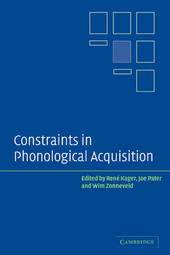
|
Constraints in Phonological Acquisition
Hardback
Main Details
| Title |
Constraints in Phonological Acquisition
|
| Authors and Contributors |
Edited by Rene Kager
|
|
Edited by Joe Pater
|
|
Edited by Wim Zonneveld
|
| Physical Properties |
| Format:Hardback | | Pages:428 | | Dimensions(mm): Height 229,Width 152 |
|
| Category/Genre | linguistics |
|---|
| ISBN/Barcode |
9780521829632
|
| Classifications | Dewey:401.93 401.93 |
|---|
| Audience | | Professional & Vocational | |
|---|
| Illustrations |
105 Tables, unspecified
|
|
Publishing Details |
| Publisher |
Cambridge University Press
|
| Imprint |
Cambridge University Press
|
| Publication Date |
15 January 2004 |
| Publication Country |
United Kingdom
|
Description
Bringing together well-known researchers, this collection of essays focuses on constraints in phonological acquisition. The first two chapters review the research in its broader context, including an introduction by the editors that provides a concise tutorial on Optimality Theory. The remaining chapters address a number of partially overlapping themes: the study of child production data in terms of constraints; learnability issues; perceptual development and its relation to the development of production; and second language acquisition.
Author Biography
Rene Kager is Associate Professor of Language Development at Utrecht University. His books include A Metrical Theory of Stress and Destressing in Dutch (1989), The Prosody-Morphology Interface (with H. van der Hulst and W. Zonneveld, Cambridge 1999) and Optimality Theory (Cambridge, 1999). Joe Pater is Assistant Professor at the University of Massachusetts at Amherst. He has published in a number of journals including Phonology, Language Acquisition and the Journal of Child Language. Wim Zonneveld is Professor of Linguistics and Phonology at Utrecht University. He is the author of A Formal Theory of Exceptions in Generative Phonology (1978), Klemtoon & Metrische Fonologie (with M. Trommelen, Couthinho, 1989) and Prosody-Morphology Interface (with R. Kager and H. van der Hulst, Cambridge 1999).
Reviews'... the volume has already achieved considerable success ... this volume is a must for anyone working in the area of phonological acquisition or optimality theory ... the volume would also make an excellent textbook for a graduate course ...'. Journal of Phonology
|